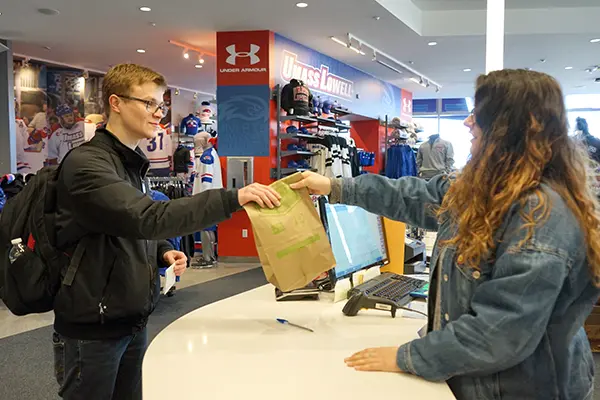River Hawk Shop’s Move Part of Larger Growing Trend to Ban Plastic Bags
 Image by Ed Brennen
Image by Ed Brennen
03/19/2019
By Ed Brennen
The university’s flagship bookstore, the River Hawk Shop, became a little greener this semester by switching from single-use plastic bags to recyclable brown paper bags.
It’s part of a citywide effort to reduce plastic in the waste stream. In January, Lowell joined a growing list of towns and cities across the commonwealth that have banned plastic bags. Lowell’s new ban applies to retail establishments 3,000 square feet and larger.
The River Hawk Shop, which is operated by the Follett Corporation, occupies more than 20,000 square feet over two floors at University Crossing.
River Hawk Shop Director Ginger Delfino says customers have applauded the change – if they’ve noticed it at all.
“Some students are excited to see that we’ve switched to paper bags, but for others it’s a normal thing,” Delfino says. “A lot of cities are banning plastic.”
According to the Sierra Club, Massachusetts residents use more than 2 billion bags per year, or about one per person per day.
Delfino estimates the River Hawk Shop goes through around 5,000 bags each semester. She says the store’s unused plastic bags, which did not have UML branding, were sent to other Follett-run bookstores in the region.
Graduate student Danielle DePalma, who works part-time as a cashier at the River Hawk Shop, is happy to now be bagging items like books, sweatshirts and coffee mugs in paper bags that are more environmentally friendly.
“I think it’s really good that Lowell is getting rid of plastic bags,” says DePalma, who earned her bachelor’s degree in criminal justice from UML last May and expects to complete her master’s degree in security studies this spring. “It sets a really good example for the surrounding areas.”
Delfino notes that many students simply use their backpacks to carry out textbook purchases, which is an even more sustainable solution. The bookstore also sells UML-branded reusable tote bags.
“Sometimes it’s easier when you bring your own bags when you’re out shopping, but the hard part is remembering them,” Delfino says. “People just need to get in that routine.”
